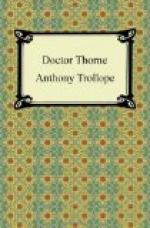’Like—I never know what a young man is like. He is like a man with red hair.’
’Uncle, you are the worst hand in describing I ever knew. If I’d seen him for five minutes, I’d be bound to make a portrait of him; and you, if you were describing a dog, you’d only say what colour his hair was.’
‘Well, he’s a little man.’
’Exactly, just as I should say that Mrs Umbleby had a red-haired little dog. I wish I had known these Scatcherds, uncle. I do admire people that can push themselves in the world. I wish I had known Sir Roger.’
‘You will never know him, Mary.’
‘I suppose not. I am so sorry for him. Is Lady Scatcherd nice?’
‘She is an excellent woman.’
’I hope I may know her some day. You are so much there now, uncle; I wonder whether you ever mention me to them. If you do, tell her from me how much I grieve for her.’
That same night, Dr Thorne again found himself alone with Sir Roger. The sick man was much more tranquil, and apparently more at ease than he had been on the preceding night. He said nothing about his will, and not a word about Mary Thorne; but the doctor knew that Winterbones and a notary’s clerk from Barchester had been in the bedroom a great part of the day; and, as he knew also that the great man of business was accustomed to do his most important work by the hands of such tools as these, he did not doubt but that the will had been altered and remodelled. Indeed, he thought it more than probable, that when it was opened it would be found to be wholly different in its provisions from that which Sir Roger had already described.
‘Louis is clever enough,’ he said, ’sharp enough, I mean. He won’t squander the property.’
‘He has good natural abilities,’ said the doctor.
‘Excellent, excellent,’ said the father. ’He may do well, very well, if he can only be kept from this;’ and Sir Roger held up the empty wine-glass which stood by his bedside. ’What a life he may have before him!—and to throw it away for this!’ and as he spoke he took the glass and tossed it across the room. ’Oh, doctor! would that it were all to begin again!’
‘We all wish that, I dare say, Scatcherd.’
’No, you don’t wish it. You ain’t worth a shilling, and yet you regret nothing. I am worth half a million in one way or another, and I regret everything—everything—everything!’
’You should not think that way, Scatcherd; you need not think so. Yesterday you told Mr Clarke that you were comfortable in your mind.’ Mr Clarke was the clergyman who had visited him.
’Of course I did. What else could I say when he asked me? It wouldn’t have been civil to have told him that his time and words were all thrown away. But, Thorne, believe me, when a man’s heart is sad—sad—sad to the core, a few words from a parson at the last moment will never make it right.’




